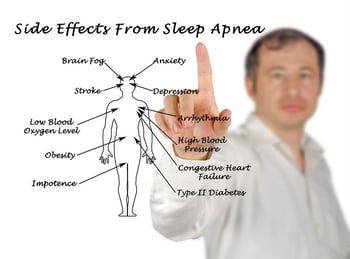What Exactly is an Anti-Anxiety Drug
Anti-anxiety drugs are a class of medications called benzodiazepines, which, in addition to treating anxiety, are used to treat muscle spasms. Some examples are:
- Valium (Diazepam)
- Xanax (Alprazolam)
- Ativan (Lorazepam)
One side effect of using anti-anxiety medications such as these is that, like sleeping pills, they relax your muscles. For people who already have untreated obstructive sleep apnea or are at risk for developing it, anti-anxiety medications may not be a good idea.
Why Anti-Anxiety Medications Aren’t Good For Obstructive Sleep Apnea
While anti-anxiety pills are good for helping your anxiety levels, their muscle relaxing property can:
- Act as an instigator of inciting sleep apnea for people at risk
- Make untreated sleep apnea worse
The reason that the muscle relaxing property of anti-anxiety pills antagonizes obstructive sleep apnea is because of what causes OSA.
What Causes Obstructive Sleep Apnea
Obstructive sleep apnea is caused when:
- Tissue and breathing muscles in back of the throat relax
- The back of the throat collapses
- Either the soft palate, back of tongue, tonsils, etc. block the airway
- Breathing ceases until the body is roused from sleep to resume breathing
You can see a visual depiction of OSA here.
Who is At Risk for Obstructive Sleep Apnea from Anti-Anxiety Pills
People who are at risk for obstructive sleep apnea already have existing risk factors (listed below) coupled with anxiety disorders that require the use of medications to be manageable. Some risk factors for obstructive sleep apnea are:
- Being overweight or obese
- Having a thick or large neck
- Having smaller airways in your throat, nose or mouth.
- Having enlarged tonsils
- Having a deviated septum
- Having a large tongue
- Having diabetes
- Genetics/family history
- Having certain medical conditions that cause sleep apnea (rare)
- Age/Sex (older men are most common demographic for sleep apnea)
- Sleeping on your back
- Drinking excess alcohol
If you are concerned about taking anti-anxiety pills but require medications to manage your anxiety, contact your healthcare provider or a sleep specialist for further information.


